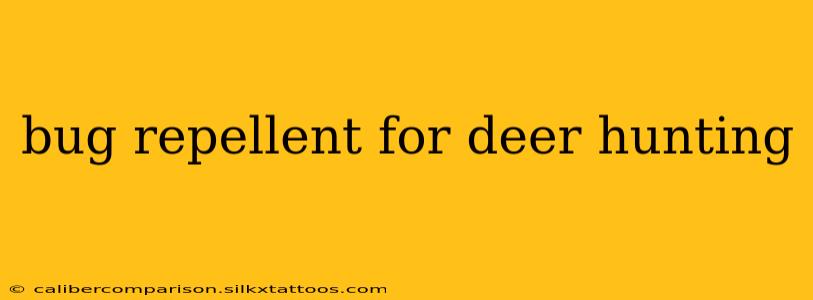Deer hunting season is a time of anticipation, strategy, and…bugs. Mosquitoes, ticks, gnats – the list of potential pests that can ruin a hunt is long. Staying comfortable and focused is crucial for a successful hunt, and that starts with choosing the right bug repellent. This comprehensive guide will help you select and effectively use deer hunting bug repellent to keep the insects away and your attention on the prize.
Understanding the Enemy: Common Hunting Season Pests
Before diving into repellents, let's identify the most common pests you'll encounter during deer hunting season:
- Mosquitoes: These bloodsuckers are notorious for their incessant buzzing and itchy bites. They're most active during dawn and dusk, the very times you're likely to be most active in the field.
- Ticks: Ticks are not only annoying but also pose a serious health risk, carrying diseases like Lyme disease. Their small size makes them difficult to detect, and their bites can go unnoticed for days.
- Black Flies (Gnats): These tiny biting flies swarm in large numbers, making them incredibly irritating. Their bites can be painful and cause significant swelling.
- Chiggers: While less common in some areas, chiggers are microscopic mites that burrow into the skin, causing intense itching.
Choosing the Right Deer Hunting Bug Repellent: Key Considerations
Not all bug repellents are created equal. Here's what to consider when choosing a repellent for your deer hunting excursions:
Active Ingredients:
- DEET: DEET is the gold standard, offering long-lasting protection against a wide range of insects, including mosquitoes and ticks. Choose a concentration appropriate for the length of your hunt – higher concentrations offer longer protection. However, be mindful of DEET's potential to damage certain plastics and fabrics.
- Picaridin: A synthetic repellent similar to DEET, picaridin is effective against mosquitoes and ticks, often preferred by those sensitive to DEET. It’s generally considered less harsh on skin and less damaging to materials.
- IR3535: This is a milder repellent, effective against mosquitoes and some other biting insects. It's a good option for children and those with sensitive skin, though it typically offers shorter protection.
- Oil of Lemon Eucalyptus (OLE): Derived from eucalyptus trees, OLE is a natural repellent effective against mosquitoes and some other insects. However, it generally offers shorter protection than DEET or picaridin.
Scent Considerations:
This is crucial for deer hunting. Strong, artificial scents can spook deer. Look for unscented or low-scent options. Some repellents are specifically formulated to minimize scent impact on wildlife. Always test a repellent in advance to ensure it doesn’t affect your hunting success.
Application and Duration:
Consider the length of your hunt when choosing a repellent. Higher concentrations and specific formulations designed for extended use will be necessary for all-day hunts. Always follow the product label instructions for application and reapplication.
Beyond Repellents: Additional Tips for Pest Control
While a good repellent is your first line of defense, these additional strategies can significantly reduce bug bites:
- Clothing: Wear light-colored, long-sleeved shirts and pants to minimize exposed skin. Tuck your pants into your socks to prevent ticks from crawling up your legs.
- Timing: Avoid peak insect activity times, typically dawn and dusk.
- Location: Choose hunting spots with good air circulation to reduce insect populations.
- Permethrin-treated clothing: Consider treating your clothing with permethrin, a long-lasting insecticide that kills insects on contact. This is particularly effective against ticks.
Conclusion: A Successful Hunt Starts with Comfort
Choosing the right bug repellent is an essential part of preparing for a successful deer hunting trip. By understanding the different repellents and employing additional pest control strategies, you can stay comfortable, focused, and ready to harvest your trophy. Remember to always prioritize safety and follow all label instructions for proper use. Happy hunting!

